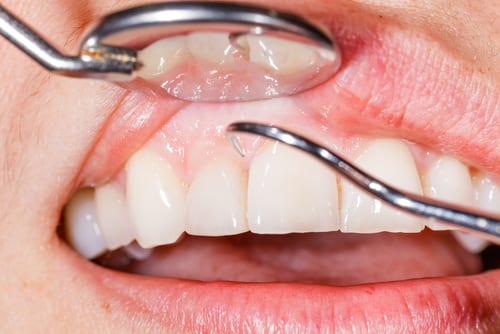Posted December 03, 2018 in Periodontal Services
Gum disease, also called periodontitis or periodontal disease, is a chronic inflammatory process that affects the gum tissue and bone supporting the teeth. Many people are surprised to learn that even if they consistently brush their teeth twice a day, floss daily, use mouthwash, and maybe even deep clean with a water pick, they still may be susceptible to this serious condition. Studies show that up to 30 percent of the American population may be genetically predisposed to gum disease. No matter how hard you try, the odds may not be in your favor for a flawless, healthy smile.

What if I’m Genetically Predisposed to Gum Disease?
Unfortunately, gum disease is common. According to recent findings from the Centers for Disease Control and Prevention (CDC), one out of every two American adults aged 30 years or older has periodontal disease. About 47 percent of adults have mild, moderate, or severe periodontitis, the more advanced form of periodontal disease. The diagnosis of gum disease should not be taken lightly, as it may lead to other chronic inflammatory diseases, such as diabetes and cardiovascular disease, and it may even cause tooth loss. This study also showed that the incidence of gum disease was more prevalent in men and Mexican Americans. Although gum disease is a serious condition, sufferers should know that their dentist can easily treat it.
Non-Surgical Treatment for Gum Disease
If you are genetically predisposed to gum disease, you will need to take more focused care of your oral health. Daily oral hygiene is imperative, along with routine visits to your dentist. Your dentist may recommend quarterly visits to help monitor your oral health and increase prevention with extra cleanings. Your dentist might also recommend extra-strength mouthwash or special toothpaste to help combat bacteria and prevent plaque build-up.
Gum disease is usually treated non-surgically unless it is extreme. Scaling, root planing, and antibiotics are some of the main periodontal procedures and the beginning steps to restoring oral health.
Scaling
Scaling will remove harmful tartar and bacteria that builds up on the tooth surface and beneath the gums. Your dentist can perform this procedure using dental instruments or lasers. Patients with sensitive gums may expect some bleeding following the procedure, but they will become tighter and healthier as you continue your oral hygiene regimen at home.
Root Planing
Root planing discourages further tartar and plaque buildup as it smoothes the root surfaces and removes bacterial byproducts that contribute to the inflammation. The result is healing that spurs the reattachment of the gum to the tooth surfaces.
Antibiotics
Your dentist may apply an antibiotic such as ARESTIN® to the treated areas of the teeth and gums to help treat any infection in those areas. Your dentist may also prescribe a topical or oral antibiotic to help control infection.
When Gum Disease Has Caused Damage
Gum disease can lead to loose teeth and tooth loss. If the damage has gone too far, the affected teeth may need to be replaced. Dentures or dental implants are the main options to restore your smile. The team at Gentle Care Dentistry will do everything possible to prevent tooth loss and the need to correct any loose or missing teeth.
If you have any concerns regarding your oral health or think you may have gum disease, please schedule an appointment by calling (575) 524-3722 or fill out our online contact form today.